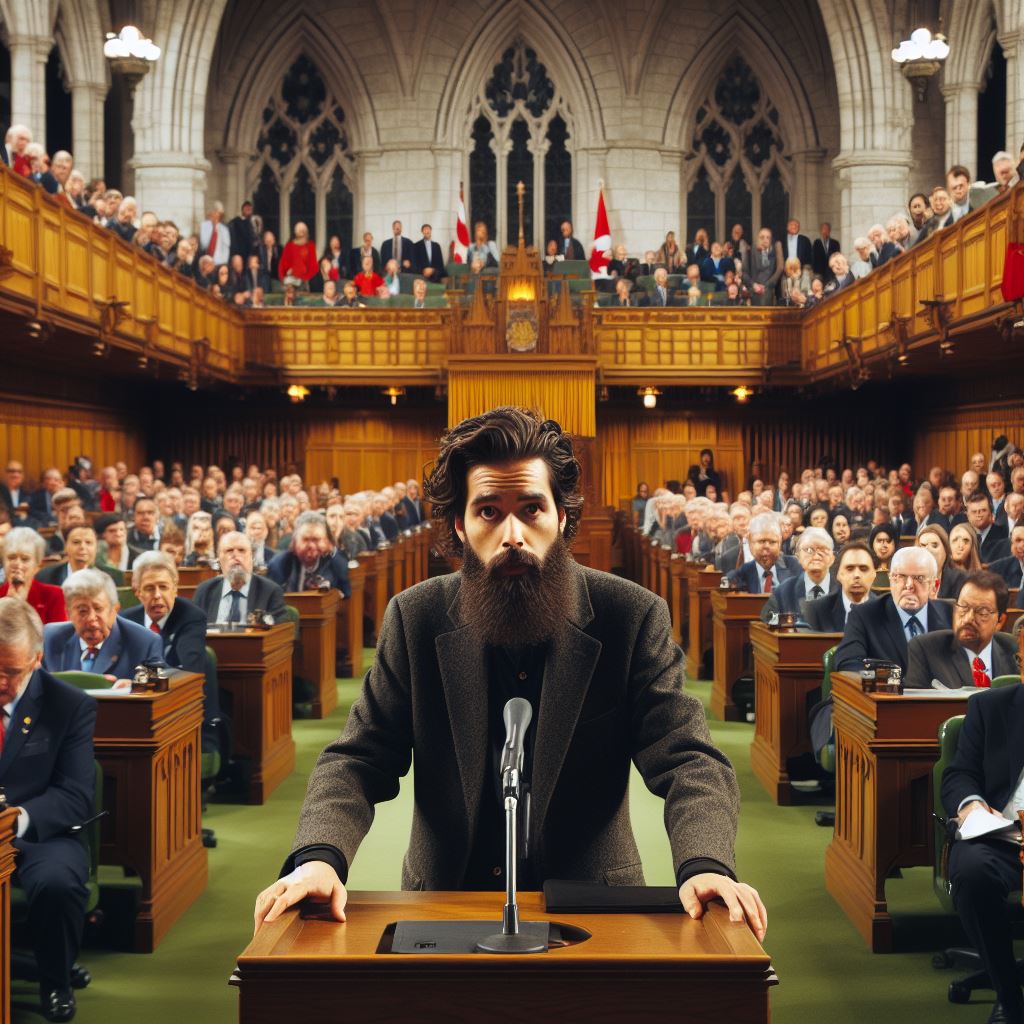Introduction
Understanding politician salaries in Canada is crucial as it allows citizens to have transparency and accountability within the government.
“Beyond the numerical figures, we’ll delve into the ethical considerations surrounding politician salaries, addressing questions of public perception, accountability, and the potential impact on political decision-making.
This exploration will also touch upon international comparisons, offering insights into how Canada’s approach to compensating its public servants aligns with global standards.
Furthermore, our journey will explore recent changes or proposed reforms in politician remuneration, providing a dynamic perspective on the evolving landscape.
By examining the interplay between public expectations, legislative frameworks, and the intricate balance between fair compensation and fiscal responsibility, we aim to foster a comprehensive understanding of the multifaceted nature of politician salaries in the Canadian context.
Join us in this in-depth exploration as we unravel the layers of Politician Salaries: A Canadian Overview, aiming not only to inform but also to spark meaningful conversations about the delicate interconnection between public service, financial considerations, and the essence of democratic governance in Canada.”
Overview of Politician Salaries in Canada
In Canada, politician salaries vary at different levels of government, namely federal, provincial/territorial, and municipal.
The different levels of government in Canada
Federal Government
- The federal government consists of the Prime Minister, Members of Parliament (MPs), and Senators.
- The Prime Minister is the highest-paid politician in Canada, earning a salary of CAD 347,400 per year.
- MPs receive a base salary of CAD 182,600 annually, with additional allowances for parliamentary roles.
- Senators receive a base salary of CAD 157,600 annually.
Provincial/Territorial Government
- Provinces and territories in Canada have their own governments, led by a Premier.
- The Premier’s salary varies depending on the province/territory and can range from CAD 120,000 to CAD 220,000 per year.
- Members of the provincial/territorial legislature (MLAs) earn around CAD 100,000 to CAD 180,000 annually.
Municipal Government
- Municipalities in Canada are governed by mayors and city councils.
- Mayors’ salaries vary greatly depending on the size and population of the municipality, ranging from CAD 50,000 to CAD 200,000 per year.
- City councilors receive annual salaries of approximately CAD 30,000 to CAD 80,000.
Factors Influencing Politician Salary Structures
Several factors contribute to the salary structures of politicians in Canada, which include the following:
Population
The population of a jurisdiction can significantly influence the salaries of politicians.
Generally, politicians representing larger populations tend to earn higher salaries.
Budget
The financial resources available to a government play a significant role in determining the salaries of politicians.
Governments with larger budgets can afford to pay higher salaries to their elected officials.
Cost of Living
The cost of living in a particular region or city can impact politician salaries.
Areas with higher costs of living may offer higher salaries to attract qualified individuals to public office.
Responsibilities and Workload
The level of responsibilities and workload associated with a political position can affect the salary structure.
Positions requiring more time and effort may demand higher salaries.
Public Perception
Public perception and expectations regarding politician salaries can also influence the remuneration.
Governments often consider public sentiment when determining appropriate salary levels.
Legislation and Independent Commissions
In some cases, legislation and independent commissions are established to set and review politician salaries.
These bodies aim to ensure fairness, transparency, and accountability in remuneration decisions.
In short, politician salaries in Canada vary across different levels of government and are influenced by factors such as population, budget, cost of living, responsibilities, public perception, and legislative measures.
Understanding these aspects is crucial for gaining insights into the compensation of elected representatives in the country.
Read: Policy Analysis in Healthcare: A Deep Dive
Salaries of Federal Politicians
Salaries of federal politicians in Canada vary depending on their positions and responsibilities.
The salary ranges for federal elected positions
Here are some details about the salary ranges for federal elected positions:
Unlock Your Career Potential
Visualize a clear path to success with our tailored Career Consulting service. Personalized insights in just 1-3 days.
Get Started- Prime Minister: The Prime Minister is the highest-paid federal politician, earning a salary of $357,800 per year.
- Members of Parliament (MPs): MPs receive a base salary of $178,900 per year.
- Cabinet Ministers: Cabinet Ministers, who hold key roles in the government, receive an additional salary on top of their MP salary. Their total compensation can range from $269,800 to $354,400.
- Speaker of the House of Commons: The Speaker of the House of Commons, who presides over parliamentary debates, receives a salary of $269,800.
- Leader of the Official Opposition: The Leader of the Official Opposition, the leader of the second-largest party in the House of Commons, earns a salary of $269,800.
Additional financial benefits or allowances that federal politicians receive
In addition to their base salaries, federal politicians also receive various financial benefits and allowances:
- Expense Allowance: MPs receive an expense allowance to cover the costs of maintaining an office, hiring staff, and other parliamentary duties. The annual allowance ranges from $55,200 to $398,700, depending on the distance between their constituency and Ottawa.
- Pension Plan: Federal politicians are entitled to a generous pension plan, which provides them with a secure retirement income.
- Travel and Accommodation: MPs are reimbursed for travel and accommodation expenses related to parliamentary work and official business.
- Health and Dental Benefits: Federal politicians have access to health and dental benefits similar to those offered to federal government employees.
Recent debates or controversies related to federal politician salaries
Despite these financial benefits, the salaries of federal politicians have been the subject of debates and controversies:
- Some argue that the salaries of federal politicians are too high, considering the average income of Canadians.
- Opponents claim that the generous benefits and allowances provided to politicians are unnecessary and contribute to public distrust.
- Others argue that competitive salaries are needed to attract qualified individuals to public office and maintain the integrity of the political system.
- Recently, there has been a push for more transparency and accountability regarding politician salaries, with calls for regular reviews and public disclosure of expenses.
Ultimately, the salaries and benefits of federal politicians in Canada continue to be a topic of discussion, as the public and policymakers grapple with questions of fairness, accountability, and the ability to attract qualified individuals to serve in government.
Read: Policy Analysts and Climate Change Policies
Salaries of Provincial/Territorial Politicians
Provincial and territorial politicians in Canada hold important elected positions that come with specific salary ranges.
These positions include Premiers and Members of the Legislative Assembly (MLAs) who represent their respective regions.
However, there can be variations in salaries between provinces and territories due to regional factors.
Salary Ranges for Provincial/Territorial Elected Positions
- Premiers: The salary range for Premiers varies between provinces and territories, with some earning higher salaries than others.
- Members of the Legislative Assembly (MLAs): The salary range for MLAs also differs across provinces and territories.
These salary ranges are determined based on various factors such as the region’s economic conditions, cost of living, and political considerations.
Variations in Salaries between Provinces/Territories
- Regional Factors: Provinces and territories with higher costs of living or larger populations may offer higher salaries to attract qualified individuals for elected positions.
- Economic Conditions: The economic prosperity or challenges faced by a province or territory may reflect in the salary range for politicians.
- Political Considerations: The political landscape and the competitiveness of elections can also play a role in determining the salary ranges across different regions.
It is important to note that while there may be variations in salaries, these elected positions still come with significant responsibilities and demands regardless of the salary ranges.
Recent Changes or Debates Regarding Provincial/Territorial Politician Salaries
Over the years, there have been ongoing debates and occasional changes regarding the salaries of provincial and territorial politicians in Canada.
These discussions often revolve around the fairness of the salaries in relation to the responsibilities and the overall economic context.
In some provinces, recent changes have been made to the salary structures of political positions.
These changes were prompted by factors such as public opinion, fiscal constraints, or political considerations.
For example, certain provinces have introduced pay freezes or reductions to align with austerity measures or to address public dissatisfaction.
Debates surrounding politician salaries often touch upon the balance between attracting capable individuals to public service and the need for responsible use of taxpayer funds.
Some argue that high salaries are required to attract skilled professionals, whereas others believe in reducing politicians’ pay to demonstrate fiscal responsibility.
The complexity of these debates highlights the challenges in establishing a standard salary range for provincial and territorial politicians across the country.
The unique circumstances and regional factors within each province and territory must be considered.
In essence, the salaries of provincial and territorial politicians in Canada vary depending on the position and the region.
Factors such as regional considerations, economic conditions, and ongoing debates contribute to the salary ranges.
Striking a balance between attracting qualified individuals and responsible fiscal management remains a critical aspect in determining these salaries.
Read: Ethics in Policy Analysis: A Critical Look

Salaries of Municipal Politicians
In Canada, the salaries of municipal politicians are determined through various factors and considerations.
Overview of Determination Process
- Salaries of municipal politicians are determined by municipal councils or committees responsible for finance and administration.
- These councils or committees consider factors such as population, budget, responsibilities, and comparison to other municipalities.
- Consultations with independent remuneration committees or experts may be conducted to ensure fairness and accountability.
Salary Ranges for Different Positions
The salary ranges for municipal politicians vary depending on the position they hold within the municipality.
Mayors
- Mayors, being the highest-ranking municipal officials, typically receive higher salaries.
- The salary range for mayors can vary greatly based on factors such as the size and complexity of the municipality.
- In larger cities, mayors may earn significantly higher salaries compared to those in smaller municipalities.
Councilors
- Salaries of councilors, who serve as representatives of their communities, also vary depending on the municipality.
- Similar to mayors, councilor salaries are influenced by the size and responsibilities of the municipality.
- In some cases, councilors receive a base salary with additional compensation for certain duties or committee memberships.
Other Elected Municipal Officials
- In addition to mayors and councilors, there are other elected municipal officials who hold specific positions.
- These officials, such as treasurers, assessors, and clerks, may have their own salary ranges determined by their responsibilities.
- Similar factors considered for mayors and councilors may apply to the determination of these officials’ salaries as well.
Differences in Salary Structures
There are notable differences in salary structures between large cities and smaller municipalities.
- In major urban centers, where the population and complexity of the municipality are higher, politicians’ salaries tend to be more substantial.
- This is due to the increased demands, responsibilities, and workload associated with governing larger populations.
- Smaller municipalities with a limited population and budget constraints may offer comparatively lower salaries.
- However, this is not always the case as some smaller municipalities may still provide competitive salaries to attract talent.
It is important to note that these salary structures are subject to regular reviews and adjustments based on various factors such as economic conditions and changes in responsibilities.
In general, salaries of municipal politicians in Canada are determined by municipal councils or committees, taking into account factors like population, budget, and responsibilities.
Mayors, councilors, and other elected officials have different salary ranges influenced by the size and complexity of the municipality.
Differences in salary structures can be observed between large cities and smaller municipalities, reflecting the demands and workload associated with governing different populations.
Read: Policy Analyst Success Stories in Canada
Factors Influencing Politician Salaries
The factors and considerations that guide the determination of politician salaries in Canada
When it comes to determining politician salaries in Canada, several factors and considerations come into play.
The role of independent committees or commissions is crucial in this process.
However, there have been criticisms and calls for potential reforms to the current salary structures.
Let’s take a closer look at these factors and the dynamics surrounding politician salaries:
Time commitment and workload
- Politicians often have demanding schedules and responsibilities that require significant time commitments.
- The workload can involve constituency work, attending meetings, researching policies, and representing constituents.
- The level of time and effort invested in their role is a key factor in determining their salaries.
Skillset and qualifications
- Politicians are expected to possess certain skills and qualifications to effectively serve their constituents.
- A higher level of education, expertise, or experience could influence salary considerations.
- Proficiency in areas such as legislation, public speaking, diplomacy, and negotiation can impact salary levels.
Cost of living
- The cost of living varies across different regions of Canada, and this can influence the salary structure.
- Politicians representing areas with higher living expenses may receive higher compensations.
- The goal is to provide adequate financial support to ensure politicians can sustain their work and personal lives.
Level of responsibility
- The level of responsibility assumed by politicians affects the determination of their salaries.
- Those in higher positions such as cabinet ministers or party leaders may receive higher compensation.
- Responsibilities like managing budgets, overseeing departments, and making critical decisions contribute to salary considerations.
The role of independent committees or commissions in deciding salaries
- Independent committees or commissions play a significant role in deciding politician salaries in Canada.
- These bodies, composed of experts from various fields, review and recommend appropriate compensations.
- Their objective is to ensure fairness, transparency, and impartiality in the salary determination process.
Criticisms and Potential Reforms
- While the current salary structures have generally been considered reasonable, there have been criticisms.
- Some argue that politicians receive excessive salaries compared to other professions or the average citizen.
- There are calls for reforms to create a more performance-based system, with salaries linked to specific metrics.
- Others propose increasing public involvement and consultation in determining politician salaries to enhance accountability.
- However, any reforms must balance the need for fair compensation with the desire to avoid excessive or inadequate payments.
In review, several factors influence politician salaries in Canada.
Time commitment, qualifications, cost of living, and level of responsibility all play a role in determining the compensation.
Independent committees or commissions aid in ensuring transparency and fairness.
While criticisms and potential reforms exist, finding the right balance remains crucial for sustaining a capable and accountable political system.
Public Opinion on Politician Salaries
The general public sentiment regarding politician salaries in Canada
The issue of politician salaries in Canada has been a topic of great interest for the general public.
Public sentiment regarding these salaries can best be summarized as a mix of dissatisfaction and controversy.
Potential reasons for public dissatisfaction or controversy surrounding these salaries
One potential reason for public dissatisfaction is the perception that politician salaries are too high compared to the average citizen’s income.
Many Canadians believe that politicians should be working for the benefit of the public and not solely for their own financial gain.
Another reason for the controversy surrounding politician salaries is the lack of transparency in the process of determining these salaries.
The public often feels that politicians have the power to set their own pay without proper accountability.
Examples of public opinion influencing salary adjustments or freezes
Public opinion has played a significant role in influencing salary adjustments and freezes for politicians in Canada.
When public dissatisfaction reaches a boiling point, politicians are pressured to take action.
In some cases, this has resulted in salary freezes or reductions to appease public sentiment.
For example, in 2013, the Members of Parliament (MPs) voluntarily froze their own salaries for three consecutive years in response to public outcry over government spending.
This decision was seen as a way to acknowledge the tough economic times faced by ordinary Canadians and to demonstrate solidarity with the public.
Similarly, in 2017, the Canadian government implemented a pay freeze for ministers and MPs for two years to address concerns about growing income inequality and to show that politicians were willing to make sacrifices during tough economic times.
The influence of public opinion on politician salaries extends beyond freezes or reductions. It has also led to changes in the way these salaries are determined.
Previously, politicians had the authority to set their own pay, but due to public pressure, independent bodies now play a significant role in deciding politician salaries.
For instance, in 2009, the Federal Accountability Act established the Independent Parliamentary Budget Officer.
This office provides an independent evaluation of MP salaries, giving more transparency to the process and reducing public skepticism.
In summary, public opinion on politician salaries in Canada is characterized by dissatisfaction and controversy.
The perception of high salaries compared to the average citizen’s income, lack of transparency, and the belief that politicians should work for the public’s benefit all contribute to this sentiment.
Public opinion has influenced salary adjustments and freezes, and has also led to the establishment of independent bodies to determine politician salaries.
Conclusion
It is important to recap the key points about politician salaries in Canada.
The salaries of politicians are determined by various factors such as their position and responsibilities.
These salaries are often debated and criticized by the public.
Transparency and public discourse regarding politician salaries are crucial.
Citizens have the right to know how their tax money is being allocated, and open discussions can lead to a better understanding of the reasoning behind these salaries.
As a final thought, the fairness and sustainability of politician salaries in Canada are subjective matters.
While there is a need to attract competent individuals to political positions, it is equally important to ensure that these salaries are reasonable and justifiable.
Canada must strike a balance between providing fair compensation to politicians and being accountable to its citizens.
Continued evaluation and reassessment will be key to maintaining a system that is both transparent and regarded as fair by the public.




